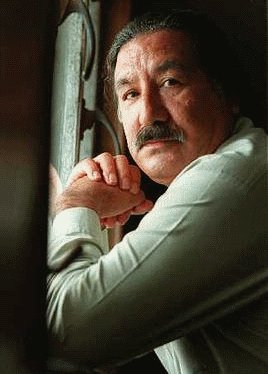COLEMAN, Fla. — Citing health issues, Leonard Peltier (Turtle Mountain Band of Chippewa Indians) has taken his name off the Party for Socialism and Liberation. Even though he has been incarcerated for the past 44 years, Peltier, 75, was on the party’s presidential ticket as the vice-presidential candidate.

His withdrawal from the ticket was announced by Gloria La Riva, who is running for president of the PSL, and who received a statement from Peltier.
“I know this is a huge disappointment to you as it is mine, that I have to drop out of the campaign with Gloria La Riva. My medical problems are not getting any better. I need to try to get home or at least closer,” Peltier said in the statement. “If so, it would be easier to get out. So please, forgive me if I have disappointed any of you. I did not intend to. Nor was I dropping out because I did not believe in it. I'm seriously hurting. Just know I love you young people who support me. You're awesome. Thank you for your support and love. Doksha, Leonard Peltier.”
Peltier did not specifically name the medical condition that is causing him to be “seriously hurting.”
Peltier’s health has long been a concern for those seeking his release from prison for his conviction of killing two FBI agents at Oglala on the Pine Ridge Indian Reservation in 1975.
Over the past two months, two national American Indian organizations have called for Peltier’s release.
Copies of letters from the two organizations were sent to Native News Online last week.
In a letter to President Donald Trump, dated June 12, 2020, the National Congress of American Indians asks the president “to use his pardon power in a compassionate way to right a wrong, to restore justice where justice has been denied, and to grant clemency to Leonard Peltier.”
NCAI further requested Peltier’s release because of the COVID-19 pandemic.
“As of the date of this letter, the Bureau of Prisons (BOP) has confirmed positive cases for 1,622 federal inmates and 196 BOP staff. We further note that Mr. Peltier’s age places him in the 65 years or older category of individuals the Center for Disease Control has determined are ‘at higher risk for severe illness from COVID-19,’” the letter continued.
In the second letter, the International Indian Treaty Council asks Rep. Tom Cole (R-OK), who is a tribal citizen of the Chickasaw Nation and co-chairman of the Congressional Native American Caucus, to initiate congressional action to gain release of Peltier.
Peltier suffers from heart problems and diabetes. He is incarcerated at the Coleman Federal Correctional Complex in Florida.
RELATED: Set Leonard Peltier Free Now
Supporters believe that Peltier, an Indigenous activist, was wrongfully convicted in 1977 for a crime he did not commit. Imprisoned for more than 45 years, Peltier has the support of Amnesty International, and other human rights organizations. Over the years, some 50 members of Congress and others — including Judge Gerald Heaney (8th Circuit Court of Appeals) who sat as a member of the court in two of Peltier’s appeals — have called for his immediate release.
Since the outbreak of the pandemic, Peltier applied for a compassionate release and was denied on May 1 with “not at this time” as the only explanation given.
The two letters come on the heels of a letter, dated April 24, 2020, from U.S. Representatives Deb Haaland (D- NM, 1st District) and Raúl Grijalva (D-AZ, 3rd District) who also asked for Peltier’s release.
More Stories Like This
Native News Weekly (August 25, 2024): D.C. BriefsUS Presidents in Their Own Words Concerning American Indians
Next on Native Bidaské: Covering Indian Country: Lessons from 2025 & the Road Ahead
The Stories That Started to Define Cultivating Culture in 2025
The National Congress of American Indians (NCAI) Mourns the Passing of Former U.S. Senator Ben Nighthorse Campbell (Northern Cheyenne)
Help us defend tribal sovereignty.
At Native News Online, our mission is rooted in telling the stories that strengthen sovereignty and uplift Indigenous voices — not just at year’s end, but every single day.
Because of your generosity last year, we were able to keep our reporters on the ground in tribal communities, at national gatherings and in the halls of Congress — covering the issues that matter most to Indian Country: sovereignty, culture, education, health and economic opportunity.
That support sustained us through a tough year in 2025. Now, as we look to the year ahead, we need your help right now to ensure warrior journalism remains strong — reporting that defends tribal sovereignty, amplifies Native truth, and holds power accountable.
 The stakes couldn't be higher. Your support keeps Native voices heard, Native stories told and Native sovereignty defended.
The stakes couldn't be higher. Your support keeps Native voices heard, Native stories told and Native sovereignty defended.
Stand with Warrior Journalism today.
Levi Rickert (Potawatomi), Editor & Publisher

